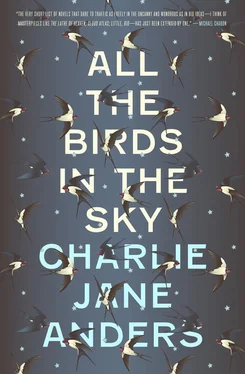Dorothea nodded and rolled her eyes.
On the drive back to San Francisco, Patricia tried to ask Kawashima about the thing Theodolphus had mentioned, the Unraveling — but of course, that sort of question was the worst possible Aggrandizement.
Patricia dozed, and in her dream she tried to figure out how Dorothea’s story ended. Then the answer came to her: the netsuke maker/assassin would have to take the frog back from his client, by force if necessary, and would sacrifice his own life in the process. The frog would have to claim someone’s life, in the end — if not the client, then the man who made it.
* * *
PATRICIA FELT ZERO closure from seeing Mr. Rose get what was coming to him. He’d seemed so pathetic, she even had to struggle to avoid feeling guilty. And she couldn’t let go of the notion that maybe Mr. Rose was telling the truth and she was doomed to become a war criminal. Kawashima kept insisting that visions of the future were worse than worthless, but then with the next breath he would tell Patricia again that her pride was dangerous. She ended up with an internal monologue that said she was a terrible, destructive person who should watch her every step.
Right after she got back from Sacramento, she had to rush to the Tenderloin to look in on Reginald, the AIDS patient she’d been assigned to as a Shanti Project volunteer. As usual, she tidied his apartment, cooked him a healthy breakfast, helped him shop. But then she paused, watching him in his unstained wooden rocking chair. And she thought, This time, I’m just going to do it. I’m going to cure him. Because why not? It would be so easy.
Except that she knew, for sure, what Kawashima and the others would say about that. You can’t just go around curing someone’s incurable disease, especially when everybody knows you were there. It would raise too many unanswerable questions. And maybe curing Reginald would be the first step toward her becoming some kind of monster, like Mr. Rose had warned.
“I hope it’s the good kind of dilemma.” Reginald broke Patricia’s reverie. “Whatever one you’re on the horns of.”
She went over and sat by Reginald, taking his hand. I’m just going to do it . She always reduced his viral load whenever she visited, anyway. Curing him outright wouldn’t be that much more of a big deal. Right?
Reginald’s studio smelled like cannabis and Nag Champa. He had a thin mustache, short gray hair and Elvis Costello glasses, and his neck had prominent tendons.
“I was just thinking,” she said. “There are so many crazy problems in the world. Like, I was just reading that we could be seeing the last of the bees in North America soon. And if that happened, food webs would just collapse, and tons more people would starve. But suppose you had the power to change things? You still might not be able to fix anything, because every time you solve a problem you’d cause another problem. And maybe all these plagues and droughts are nature’s way of striking a balance? We humans don’t have any natural predators left, so nature has to find other ways to handle us.”
Reginald had tattoos all over his pale torso, one for each species of insect he had discovered across the Americas. These insect drawings resembled something out of a Victorian naturalist’s handbook, with just splashes of color here and there. As Reginald’s body had changed, his loose folds of skin and potbelly made it appear as though the locusts and butterflies were flexing their wings and twitching their heads. His pecs were all wasps, his arms sleeved with shiny chitinous beetles.
“I am, as you know, a fan of nature,” said Reginald. “And yet, nature doesn’t ‘find ways’ to do anything. Nature has no opinion, no agenda. Nature provides a playing field, a not particularly level one, on which we compete with all creatures great and small. It’s more that nature’s playing field is full of traps.”
In the end, she stopped just short of curing Reginald outright. Just like always.
* * *
PATRICIA DREAMED SHE got lost in the woods, like she had when she was a girl. Stubbing her toes on roots, skidding on dead leaves, feeling transported by the cavelike scent of damp earth. Clouds of insects in her eyes, and up her nose. She laughed so hard she snorted dead bugs, for joy at being out of the city at last. And then she wandered into a clot of thornbushes, which tore at her skin and clutched so hard she couldn’t go forward or backward without shredding, and her giddiness turned to anxiety, because what if people needed her help? Or the other witches? What if she was going AWOL right when someone was in trouble?
The more she tried to force her way out of the bracken, the harder it tore at her, until she realized that this was her dream, and she could always fly in dreams. She lifted up out of the thicket and flew up, along a steep incline that was studded with roots. And then it came into view: huge and dark, like a raven formed of branches and leaves. A huge ancient Tree, filled with patience and enough memories for a billion rings, twin branches undulating as in greeting.
* * *
“SO WHAT WAS the thing you couldn’t tell me about over the phone?” Laurence asked as he brought their espressos from the counter.
In response, Patricia just pulled the tiny wooden figurine out of her bag and told Laurence who it was. Mr. Rose stared up at them, wide-eyed frog face looking prayerful one moment, whimsical the next.
“This is him? This is the actual person?” Laurence kept holding it up to the light, like he was trying to see some resemblance. “He’s so … tiny.”
“Yeah,” Patricia said. “I have no idea what to do with him.”
Laurence and Patricia were in the Circle of Trust, which had been the trendy coffee shop in the Valencia Street corridor about eighteen months earlier. It still had all of the nice wooden fixtures and the super-expensive espresso machines, but it was half-empty because all the best people had already moved on to the new place, a block away. The Circle of Trust was having an art show featuring finger paintings done by a twenty-eight-year-old woman, with subversively naive word balloons. The coffee was super-pricey, with all the shortages, but they still went Dutch.
“Seeing him so helpless, and watching him get transformed into this tiny object.… it doesn’t change my memories of how huge and terrible he was,” Patricia said. “It’s like two different people. And it sounds like he’s spent a lot of the last several years being a thorn in the side of the other witches. Because he went crazy and had some kind of apocalyptic vision. That’s why he was at our school in the first place, because he thought I would grow up to become a monster.”
“Huh.” Laurence stared at the figurine. Patricia felt self-conscious about how borderline obscene the raised skirts were, how weird this was in general. “But you didn’t. Grow up to become a monster, I mean. And come on. Did he ever tell anyone the truth? About anything?”
“No,” Patricia said. She took the figurine and slipped it back into her purse. She was going to beg Kawashima to take Mr. Rose off her hands. “No, he didn’t.”
“He was a compulsive liar. Is. Was. Not sure what tense to use.”
There could be a better conversation killer than plunking down your most hated childhood authority figure, shrunk to the size of a man’s thumb. But Patricia couldn’t think of one. The two of them sipped coffee and shook their heads, trapped in recursively horrible memories. Patricia had to fetch water and guzzle it. The café’s stale air had stayed almost as hot as noon, even as the sun drifted below the skyline.
Laurence was staring at Patricia’s purse, where she’d put the figurine away. “I think all the time about how close he came to ruining my life. It’s one of the reasons I’m so desperate to succeed, because I almost didn’t get this chance.” Abruptly he stood up. “Come on. I want to show you something.” Patricia was struck anew by just how tall he’d gotten. Patricia was tall too, but she came up to his collarbone. And he had enough nervous energy for nine ferrets.
Читать дальше












